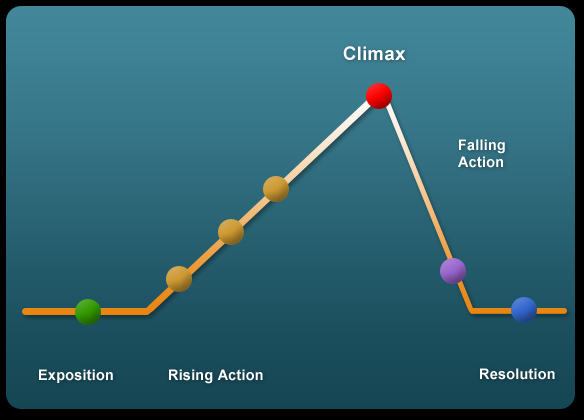Who?
What?
Where?
- A lonely house on a dark night.
- Organization – Dark and gloomy.
When?
A few years after the character initially got Proserpina.
Timeline — Text Version

- Exposition: The story takes place in the underworld. Pluto, a Roman man, is lonely living in the “Land of the Dead.”
- Rising Action: Pluto decided that the girl above him picking flowers, Proserpina, was the perfect candidate for the job (Geringer et al., 1995).
- Climax: When Hermes, another God, comes to the underworld to rescue Proserpina, she had already eaten the pomegranate seeds, which meant she was unable to leave the God’s kingdom.
- Falling Action: Pluto realizes that he made a mistake in taking the child away, but it is too late to do anything; she already ate something from him.
- Resolution: When Pluto decides he wants to help Proserpina exit his dark and dreary world, he realizes that the pomegranate she ate years ago wasn’t from his kingdom.
- Voice: The author uses a formal diction to tell the story.
How?
Point of View
- What point of view will you use in your story? I will utilize an omniscient point of view.
- Why did you choose that point of view? Because it is easier to read and write when the authors know everything about the characters.
Tone—What is the attitude of your story?
- Words to describe the tone: The tone would be low, sad, and depressing.
- How will you communicate that tone? By having a word choice which communicates the dark tone that Pluto feels.
- How do you want readers to feel after they read your story? I would like the readers to feel pity for Pluto.
Pace—How fast is your story going to move?
- What pace fits your narrative: The pace would take shorter sentences at first, which would then change to long sentences as the story continues. The pace needs to change throughout the book, it should start fast and become slower as it progresses.
- Why? The pace should get slower as the character slips into the depressive state.
- How will you create that pace? By explaining how king Pluto knew Proserpina and how he lost her.
Reference
Geringer, L., Gore, L., & Hawthorne, N. (1995). The pomegranate seeds: A classic Greek myth. Houghton Mifflin.